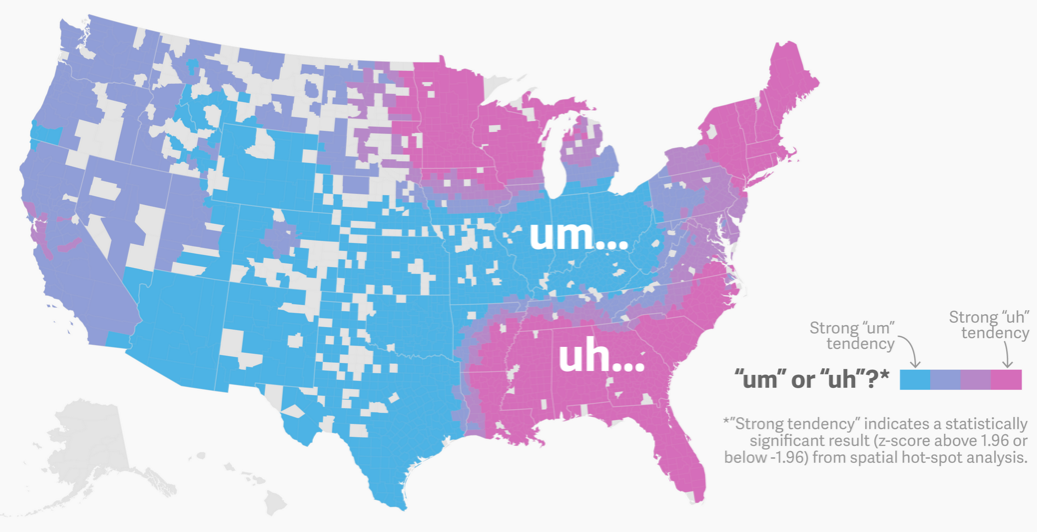UM / UH map in the media
« previous post | next post »
Jack Grieve's map ("UM / UH geography", 8/13/2014) has been featured in an article by Nikhil Sonnad, "Um, here’s an, uh, map that shows where Americans use 'um' vs. 'uh'", Quartz 9/15/2014. Unfortunately, the lovely map in the article reverses the UM and UH areas (just as I did in the first version of the 8/13 post):
Jack has pointed this out to the Quartzites, so it should be corrected soon.
The article also misspells my name as "Lieberman" rather than "Liberman".
Why the spelling with 'i' rather than 'ie'? Apparently my father's (great-?) grandfather immigrated to the U.S. from a region of Eastern Europe that used the cyrillic alphabet, so that the name would have been spelled Либерман. (My father knew the name of the village that his ancestors came from, but not the country it was in, apparently because the country was not salient or at least stable in the talk he overheard.)
And at some point in the late 19th century, in St. Joseph MO (where my father's family ended up), the transliterated spelling "Liberman" encouraged the rule (or analogical principle) of trisyllabic laxing, so that the first syllable rhymes with bib rather than beeb.

D.O. said,
September 17, 2014 @ 9:50 am
This map is smoothed too much. And what "statistical significance" means in a case of a hot-spot map? If there is no effect (your null-hypothesis) and they generate a map using square root noise then 95% of the generated maps won't reach such high levels of imbalance? Does anyone really use this measure?
John Coleman said,
September 17, 2014 @ 6:01 pm
I found the story about Mark's family's origins and spelling of the family name rather more interesting than the map. Also, getting the labels on a map 100% wrong I can empathize with, having made a similarly egregious error in (thankfully unpublished) research.
Coby Lubliner said,
September 18, 2014 @ 7:48 am
It could also be that Mark's ancestor spoke Lithuanian Yiddish (not limited to present-day Lithuania), in which all vowels are short, and if he gave his name orally to the immigration officer it would sound to him like the first part of "liberty" or "liberal" and would be transcribed accordingly.
Transliteration from Cyrillic is a fairly new phenomenon, and it's only recently that you find immigrants' names ending in, say, -stein transcribed as -shteyn.